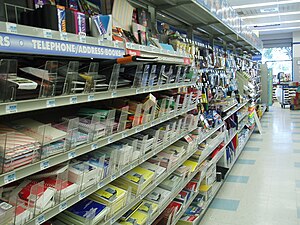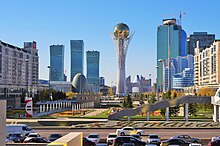
Back بوابة:الاقتصاد Arabic Portal:Ekonomija BS Portal:Economia Catalan دەروازە:ئابووری CKB Portál:Ekonomie Czech Portal:Wirtschaft German Πύλη:Οικονομία Greek Portal:Economía Spanish Portaal:Majandus Estonian درگاه:اقتصاد Persian
The Business and Economics Portal Business is the practice of making one's living or making money by producing or buying and selling products (such as goods and services). It is also "any activity or enterprise entered into for profit." A business entity is not necessarily separate from the owner and the creditors can hold the owner liable for debts the business has acquired. The taxation system for businesses is different from that of the corporates. A business structure does not allow for corporate tax rates. The proprietor is personally taxed on all income from the business. A distinction is made in law and public offices between the term business and a company such as a corporation or cooperative. Colloquially, the terms are used interchangeably. (Full article...) Economics (/ˌɛkəˈnɒmɪks, ˌiːkə-/) is a social science that studies the production, distribution, and consumption of goods and services. Economics focuses on the behaviour and interactions of economic agents and how economies work. Microeconomics analyses what's viewed as basic elements in the economy, including individual agents and markets, their interactions, and the outcomes of interactions. Individual agents may include, for example, households, firms, buyers, and sellers. Macroeconomics analyses the economy as a system where production, distribution, consumption, savings, and investment expenditure interact, and factors affecting it: factors of production, such as labour, capital, land, and enterprise, inflation, economic growth, and public policies that have impact on these elements. (Full article...) Selected article American International Group, Inc. (AIG) is an American multinational finance and insurance corporation with operations in more than 80 countries and jurisdictions. As of 2023, AIG employed 25,200 people. The company operates through three core businesses: general insurance, life & retirement, and a standalone technology-enabled subsidiary. General Insurance includes Commercial, Personal Insurance, U.S. and International field operations. Life & Retirement includes Group Retirement, Individual Retirement, Life, and Institutional Markets. AIG is the title sponsor of the AIG Women's Open golf tournament. In 2023, for the sixth consecutive year, DiversityInc named AIG among the Top 50 Companies for Diversity list. AIG's corporate headquarters are in New York City and the company also has offices around the world. AIG serves 87% of the Fortune Global 500 and 83% of the Forbes 2000. AIG was ranked 60th on the 2018 Fortune 500 list. According to the 2016 Forbes Global 2000 list, AIG is the 87th largest public company in the world. On December 31, 2017, AIG had $65.2 billion (~$79.7 billion in 2023) in shareholder equity. Selected image
Selected economyThe economy of Kazakhstan is the largest in Central Asia in both absolute and per capita terms. In 2021, Kazakhstan attracted more than US$370 billion of foreign investments since becoming an independent republic after the collapse of the former Soviet Union. It possesses oil reserves as well as minerals and metals. It also has considerable agricultural potential, with its vast steppe lands accommodating both livestock and grain production. The mountains in the south are important for apples and walnuts; both species grow wild there. Kazakhstan's industrial sector rests on the extraction and processing of these natural resources. (Full article...) Selected quote"For a long time men failed to realize that the transition from the classical theory of value to the subjective theory of value was much more than the substitution of a more satisfactory theory of market exchange for a less satisfactory one. The classical economists met in the pursuit of their investigations an obstacle which they failed to remove, the apparent antinomy of value. Their general theory of choice and preference goes far beyond the horizon which encompassed the scope of economic problems as circumscribed by the economists from Cantillon, Hume and Adam Smith down to John Stuart Mill. It is much more merely a theory of the "economic side" of human endeavors and of man's striving for commodities and an improvement in his material well-being. It is the science of every kind of human action. Choosing determines all human decisions. In making his choice man chooses not only between various material things and services. All human values are offered for option. All ends and all means, both material and ideal issues, the sublime and the base, the noble and the ignoble, are ranged in a single row and subjected to a decision which picks out one thing and sets aside another. Nothing that men aim at or want to avoid remains outside of this arrangement into a unique scale of gradation and preference. The modern theory of value widens the scientific horizon and enlarges the field of economic studies. Out of the political economy of the classical school emerges the general theory of human action, praxeology. The economic or catallactic problems are embedded in a more general science, and can no longer be severed from this connection. No treatment of economic problems proper can avoid starting from acts of choice; economics becomes a part, although the hitherto best elaborated part, of a more universal science, praxeology."
TopicsRelated WikiProjectsDid you know (auto-generated) -
On this day in business history
General imagesThe following are images from various business-related articles on Wikipedia.
More did you know
Business news Wikinews Economy and business portal
|
© MMXXIII Rich X Search. We shall prevail. All rights reserved. Rich X Search






































